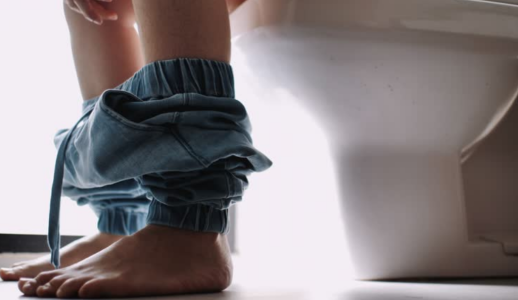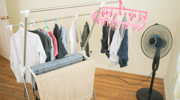Deadly cancer warning urges Aussies to check poo for crucial sign
By
Gian T
- Replies 2
Let’s be honest—talking about what happens in the bathroom isn’t exactly a dinner table conversation.
But when it comes to your health, it’s time to break the taboo and get comfortable with the uncomfortable.
That’s the message from health experts and advocates across Australia, as the country faces a worrying rise in cases of bowel cancer—especially among younger adults.
Natalie Hunter, a 45-year-old mum from the Sunshine Coast, never imagined that a change in her toilet habits would turn her world upside down.
Four years ago, Natalie started experiencing mild stomach issues. Like many of us, she brushed them off, chalking it up to stress or a dodgy meal.
Even when blood tests revealed low iron, she didn’t think much of it.
But things took a turn around Christmas. Natalie noticed her stools were thinner and much darker than usual.
'I thought my tummy just wasn’t happy with all the festive food,' she recalled.
But after five days of constipation and mounting pain, she visited her GP, who prescribed medication typically used before colonoscopies.
When that didn’t help, and the pain became unbearable, Natalie ended up in the emergency room.
A scan revealed the shocking truth: a tumour was blocking her bowel. The diagnosis is stage four bowel cancer, which had already spread to her liver.
In an instant, Natalie’s life—and the lives of her two children—changed forever.
Australians are being urged to check their poo and watch for bowel changes as cancer rates rise, especially in those under 50. Credit:
Bowel cancer (also known as colorectal, colon, or rectal cancer) is often thought of as a condition that only affects older people.
However, new data shows Australia now has the highest rates of bowel cancer in people under 50 anywhere in the world.
Experts are calling the spike in cases among individuals aged 25–49 'alarming'.
Natalie’s story is a stark reminder that bowel cancer doesn’t discriminate by age.
She had no family history and no idea she was at risk. Her only warning signs were subtle changes in her bathroom habits—something many of us might ignore or feel too embarrassed to discuss.
Natalie’s story is a powerful reminder to listen to your body and take any changes seriously.
Symptoms like blood in your stool, altered bowel habits, abdominal pain, unexplained weight loss, ongoing fatigue, or vomiting shouldn’t be ignored—especially if they last more than a couple of weeks.
Seeing your GP and requesting further tests could make all the difference. When found early, bowel cancer is 99 per cent treatable.
Natalie’s diagnosis led to a whirlwind of medical interventions.
Within 24 hours of being admitted to the hospital, she was fitted with a stoma bag to relieve her pain.
She had to put her business on hold and focus on her health, not knowing how long her recovery would take.
Her treatment began with chemotherapy to shrink the tumours, followed by a liver resection (removal of part of the liver).
In total, 70 per cent of her liver was removed, and she endured months of illness, infections, and repeated hospital stays.
Just as she started to recover, scar tissue caused new bowel obstructions, and a routine scan in September 2024 revealed the cancer had spread to her lungs.
Now, she’s undergoing another round of intensive chemotherapy.
Despite these setbacks, Natalie is determined to use her experience to help others.
She’s become an advocate for Bowel Cancer Australia, working to raise awareness and encourage Aussies to 'check their poo'.
Let’s face it—most of us would rather talk about anything else. But as Natalie says, 'We have to check our poos.' It’s as normal as breathing, and it could be the difference between life and death.
Unfortunately, embarrassment and stigma are significant barriers to early detection.
Adam Carpenter, mill manager at Kimberley-Clark Australia, points out that bowel cancer is the country’s second-deadliest cancer overall and the deadliest for Australians aged 25–54.
Yet, a lack of awareness and reluctance to discuss symptoms means many cases are detected too late.
To help change this, Kleenex and Bowel Cancer Australia have teamed up for a new campaign.
Their message is simple: don’t ignore changes in your bowel habits, and don’t be afraid to talk to your doctor.
Kleenex products will soon feature links to more information and support, making it easier for Aussies to learn about the signs and symptoms.
Being aware of bowel cancer means recognising the warning signs, not dismissing changes in your body, and taking action when something feels off.
If you're over 50, take advantage of the free National Bowel Cancer Screening Program—but even if you're younger, don’t delay getting checked if you have symptoms.
And, importantly, talk openly with friends and family; breaking the silence helps reduce stigma and encourages others to seek help early.
 Have you or someone you know experienced a bowel cancer scare? Did you notice any unusual symptoms that prompted you to see a doctor? We’d love to hear your stories and tips in the comments below.
Have you or someone you know experienced a bowel cancer scare? Did you notice any unusual symptoms that prompted you to see a doctor? We’d love to hear your stories and tips in the comments below.
But when it comes to your health, it’s time to break the taboo and get comfortable with the uncomfortable.
That’s the message from health experts and advocates across Australia, as the country faces a worrying rise in cases of bowel cancer—especially among younger adults.
Natalie Hunter, a 45-year-old mum from the Sunshine Coast, never imagined that a change in her toilet habits would turn her world upside down.
Four years ago, Natalie started experiencing mild stomach issues. Like many of us, she brushed them off, chalking it up to stress or a dodgy meal.
Even when blood tests revealed low iron, she didn’t think much of it.
But things took a turn around Christmas. Natalie noticed her stools were thinner and much darker than usual.
'I thought my tummy just wasn’t happy with all the festive food,' she recalled.
But after five days of constipation and mounting pain, she visited her GP, who prescribed medication typically used before colonoscopies.
When that didn’t help, and the pain became unbearable, Natalie ended up in the emergency room.
A scan revealed the shocking truth: a tumour was blocking her bowel. The diagnosis is stage four bowel cancer, which had already spread to her liver.
In an instant, Natalie’s life—and the lives of her two children—changed forever.
Australians are being urged to check their poo and watch for bowel changes as cancer rates rise, especially in those under 50. Credit:
Bowel cancer (also known as colorectal, colon, or rectal cancer) is often thought of as a condition that only affects older people.
However, new data shows Australia now has the highest rates of bowel cancer in people under 50 anywhere in the world.
Experts are calling the spike in cases among individuals aged 25–49 'alarming'.
She had no family history and no idea she was at risk. Her only warning signs were subtle changes in her bathroom habits—something many of us might ignore or feel too embarrassed to discuss.
Natalie’s story is a powerful reminder to listen to your body and take any changes seriously.
Symptoms like blood in your stool, altered bowel habits, abdominal pain, unexplained weight loss, ongoing fatigue, or vomiting shouldn’t be ignored—especially if they last more than a couple of weeks.
Seeing your GP and requesting further tests could make all the difference. When found early, bowel cancer is 99 per cent treatable.
Natalie’s diagnosis led to a whirlwind of medical interventions.
She had to put her business on hold and focus on her health, not knowing how long her recovery would take.
Her treatment began with chemotherapy to shrink the tumours, followed by a liver resection (removal of part of the liver).
In total, 70 per cent of her liver was removed, and she endured months of illness, infections, and repeated hospital stays.
Just as she started to recover, scar tissue caused new bowel obstructions, and a routine scan in September 2024 revealed the cancer had spread to her lungs.
Now, she’s undergoing another round of intensive chemotherapy.
She’s become an advocate for Bowel Cancer Australia, working to raise awareness and encourage Aussies to 'check their poo'.
Let’s face it—most of us would rather talk about anything else. But as Natalie says, 'We have to check our poos.' It’s as normal as breathing, and it could be the difference between life and death.
Unfortunately, embarrassment and stigma are significant barriers to early detection.
Adam Carpenter, mill manager at Kimberley-Clark Australia, points out that bowel cancer is the country’s second-deadliest cancer overall and the deadliest for Australians aged 25–54.
Yet, a lack of awareness and reluctance to discuss symptoms means many cases are detected too late.
Their message is simple: don’t ignore changes in your bowel habits, and don’t be afraid to talk to your doctor.
Kleenex products will soon feature links to more information and support, making it easier for Aussies to learn about the signs and symptoms.
Being aware of bowel cancer means recognising the warning signs, not dismissing changes in your body, and taking action when something feels off.
If you're over 50, take advantage of the free National Bowel Cancer Screening Program—but even if you're younger, don’t delay getting checked if you have symptoms.
And, importantly, talk openly with friends and family; breaking the silence helps reduce stigma and encourages others to seek help early.
Key Takeaways
- Australians are being urged to check their poo and be aware of changes in bowel habits, as rates of bowel cancer are rising, especially among people aged under 50.
- Mum-of-two Natalie Hunter’s symptoms — including thin, dark stools, constipation and abdominal pain — led to a stage four bowel cancer diagnosis despite having no family history.
- Experts warn that common signs of bowel cancer include blood in stools, changes in bowel habits, tummy pain, unexplained weight loss, vomiting and persistent tiredness.
- A new campaign encourages Aussies to overcome embarrassment and learn about the symptoms, as early detection makes bowel cancer 99 per cent treatable.








